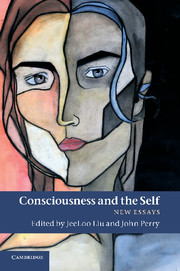Book contents
- Frontmatter
- Contents
- Acknowledgments
- Contributors
- Introduction
- Chapter 1 Awareness and identification of self
- Chapter 2 Self-representationalism and the explanatory gap
- Chapter 3 Thinking about the self
- Chapter 4 Ordinary self-consciousness
- Chapter 5 Waiting for the self
- Chapter 6 I think I think, therefore I am – I think
- Chapter 7 Knowing what I want
- Chapter 8 Self-ignorance
- Chapter 9 Personhood and consciousness
- Chapter 10 My non-narrative, non-forensic Dasein
- References
- Index
Chapter 9 - Personhood and consciousness
Published online by Cambridge University Press: 05 December 2011
- Frontmatter
- Contents
- Acknowledgments
- Contributors
- Introduction
- Chapter 1 Awareness and identification of self
- Chapter 2 Self-representationalism and the explanatory gap
- Chapter 3 Thinking about the self
- Chapter 4 Ordinary self-consciousness
- Chapter 5 Waiting for the self
- Chapter 6 I think I think, therefore I am – I think
- Chapter 7 Knowing what I want
- Chapter 8 Self-ignorance
- Chapter 9 Personhood and consciousness
- Chapter 10 My non-narrative, non-forensic Dasein
- References
- Index
Summary
I take as my text John Locke’s definition of person: “[A] thinking intelligent being, that has reason and reflection, and can consider itself as itself, the same thinking thing, in different times and places, which it does only by that consciousness which is inseparable from thinking, and, as it seems to me, essential to it” (Locke [1689] 1975, 285). One important point about this passage is that it makes being the subject of certain psychological properties essential to persons. This goes well with the view commonly associated with Locke, that personal identity consists in something psychological. I will expand on that connection later on. A second important point is that the properties held to be essential to persons include consciousness – more specifically, self-consciousness. So the two concepts that figure in the title of this book, that of consciousness and that of the self, are linked in Locke’s definition.
I think that insofar as “selves” are a kind of entities, they are no different from persons. The term “self” is used to refer to a person as that person conceives and knows itself. Locke’s definition asserts a close connection between the nature of selves, or persons, and the access they have to themselves and their identities.
- Type
- Chapter
- Information
- Consciousness and the SelfNew Essays, pp. 198 - 213Publisher: Cambridge University PressPrint publication year: 2011

